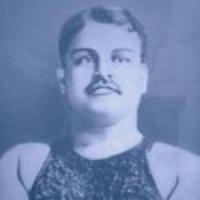
Gobor Goho, India’s first-ever official world champion
Although Gama Pehelwan
was the first Indian wrestler to be considered a world champion, he could not
be officially crowned because at the time in 1910 there was no official
wrestling championship for professional wrestlers. That ultimate crown was
reserved for Gobor Goho, an almost unknown name in modern India.
Some people do not require prefixes or suffixes. They
fly high on their own. They inspire. They mould. They become the vanguard of
movements. They do not crave for fame or fortune. In every field of endeavour
they exist. They are the karma-yogis who just leave behind a trail for others
to follow.
Such a soul was Gobor Goho of Calcutta. He won the
world light-heavy weight wrestling championship in 1921. Gobor was a rare
wrestler. He combined academics and music with massive physical strength. High
on courage and technical skills, he was a prominent name in world wrestling in
the 1920s. No opposition was formidable enough for him. No occasion,
awe-inspiring. At 6 feet, 2 inches and weighing around 250 pounds, he himself was
an imposing figure.
Born Jatindra Charan Goho on 23rd March
1892 in a wealthy, enlightened background, he did not wrestle for money or for
political patronage. His grandfather Ambika was great advocate of
physical-culture among the Indian youths, especially belonging to the wealthy
families who despised the idea of physical effort.
Ambika Charan
Goho established an ankhara at his
north Kolkata residence way back in the 1880s. Later his sons Khetra Charan and
Ram Charan (Gobor’s father) carried on the mission. The famous freedom-fighter
‘Bagha’ Jatin and Narendranath Dutta (later Swami Vivekananda) were trainees at
the Goho wrestling ankhara.
Young Jatindra was a meritorious student. But unlike
his father and uncle, he could not attain the ‘first’ rank in his academic
class. His grandfather Ambika Charan lovingly said, “He has gobor (cow-dung) instead of giloo
(grey-cells) in his head.” But his
grandmother would not take it lying down. “Don’t worry,” she added, “his gobor will be worth more than your giloo.” Thus Jatin became Gobor
overnight, as it were. Even such a rude, awkward nickname could not rattle the
focus of this karma-yogin.
Khetra Charan
and Ram Charan realized the young
Gobor’s potential and so appointed Khosla Choubey, a famous wrestler, to guide
and advise him. Later Gobor came under the tutelage of Rehmani and Khalifa, two
famous pehelwans of the period, and
took part in wrestling competitions all over India and abroad.
In 1910 Maharaja of Patiala, Bhupendra Singh sent
Gama, Imam Baksh, Ahmed Baksh, Gamu and Gobor to Europe. Within days, however,
he was forced to return as he had vanished without informing his parents! He
was just 17 at the time and his father, although a great patron of wrestling,
was extremely annoyed because Gobor had not shown the obedience and discipline
expected of him.
That trip saw Gama emerging as the unofficial world
champion. This was just the catalyst that young Gobor needed. Inspired by
Gama’s magnificent exploits, young Gobor practised hard and diligently in his
quest for the crown. In 1913 in UK he annexed the Scottish and the British
titles. Following year in Paris he became the European champion.
But the philosopher-wrestler wanted only the world
title. In 1921 at San Francisco he finally encountered Adolf Shantel, the world
champion. It was a clash of titans, where the champion succumbed to Goho’s
skill, speed and stamina.
The international community hailed the new champion of
the world light-heavy weight crown. Unlike his famous compatriots, Gobor made
many trips abroad and was highly acclaimed for his erudition, patriotism and
for his wrestling prowess.
But in India, Gobor Goho’s success was only grudgingly
acknowledged. Prejudice and jealousy kept his international eminence submerged.
He did not belong to any of the influential
akharas. Nor did he depend on any princely patronage. Rather he himself was
nicknamed “The Prince” for his bearing and background.
His world championship-winning feat has hardly ever
been highlighted in partisan India. In India at the time it was felt that a
person hailing from a wealthy background did not deserve to be an eminent
wrestler! Even now the sentiment has hardly altered. Gobor Goho, ever the
karma-yogin, cared not. He traversed his own path with his head held high.
Wonderful reading! So good to learn about sporting legends in fields other than cricket, too!
ReplyDeleteThanks. Glad to learn that there are still normal sports-minded people in the country.
Delete